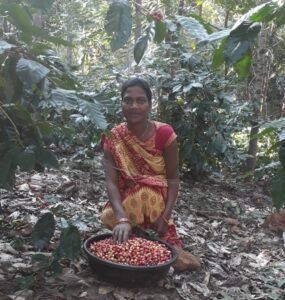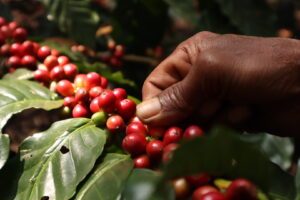
Ahmedabad 26th December 2024: In the hills of Koraput, Odisha, 37-year-old TulabatiBadanayak has long balanced the demands of farming with her responsibilities as a mother of four. Alongside her husband, Purna, she has depended on coffee farming to support her family. However, like many small-scale farmers, limited education and resources have made it difficult to build a stable life. Faced with these challenges, Tulabati, along with others in her community, began exploring new ways to improve their agricultural practices. Through Project Unnati Coffee, a collaborative initiative by ISWAR (Integrated Social Welfare and Research Centre) and Coca-Cola India focused on sustainable farming, Tulabati and her fellow farmers gained access to training on best practices, which not only improved the quality of their coffee harvest but also inspired a broader shift toward self-sufficiency and environmental responsibility in the region.

How Coffee became a catalyst of transformation
Project Unnati was introduced to empower farmers like her to implement sustainable practices and post-harvest techniques such as selective harvesting, pulping, and sun drying, enabling her to significantly improve the quality of her produce. These small but powerful changes led to a ripple effect—traders began to notice the difference in her produce and offered higher prices for her premium beans. For the first time in years, Tulabati saw an opportunity to increase her income and create a better future for her family.
However, Project Unnati didn’t stop at agriculture. It extended its reach into environmental conservation, specifically addressing the growing pollution and inaccessibility of local waterfalls and streams, which were increasingly becoming a problem due to the influx of tourism. Through a three-day eco-tourism training program organized by ISWAR, villagers like Tulabati learned how to restore the area by clearing pathways through coffee plantations and offering guided tours. These tours brought in fees that now contribute to a communal village fund, fueling both environmental preservation and economic growth.
“The training taught us how to manage our plantations better. Clearing wild shrubs and selectively plucking ripened fruits has doubled the market value of our coffee,”Tulabati explains. “Today, traders actively seek our produce. I expect to earn an additional INR 25,000 from eco-tourism and the improved coffee harvest. With this money, I plan to renovate my house’s earthen flooring into a concrete and tiled finish, creating a better living environment for my children. I also want to invest in their education, as I firmly believe it can change their future. I do not differentiate between boys and girls. My elder daughters are currently attending school 6 km away from my village.”
A Blueprint for Community-Driven Change
What started as an effort to improve her harvest has blossomed into a stronger, more connected community, a cleaner environment, and a more stable future. As a member of the producers’ group formed through Project Unnati Coffee, Tulabati now shares her expertise in plantation management, post-harvest processing, and marketing with 20 other women. Her efforts have sparked a collective movement, empowering other farmers to adopt sustainable practices and strengthening the community’s resilience. What began as a simple farming initiative has become a blueprint for sustainable, community-driven change.



